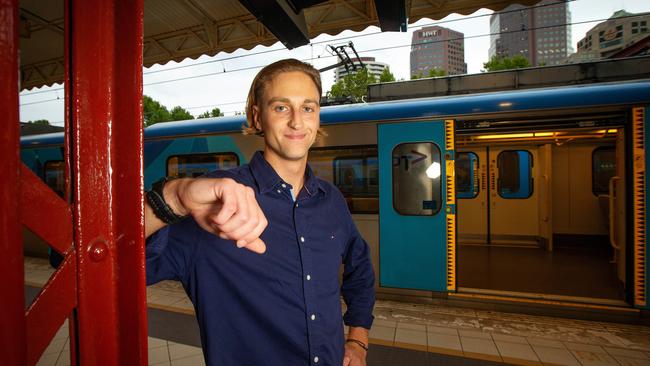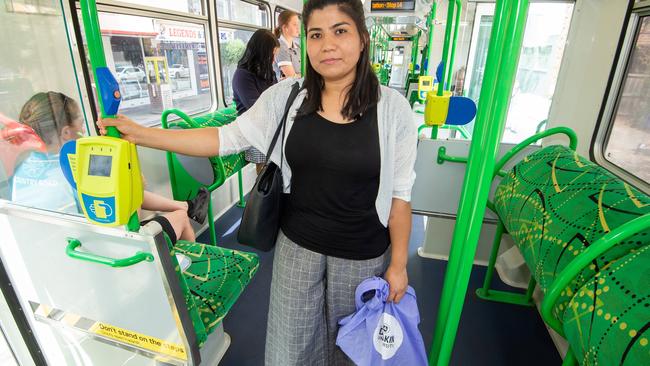Metro and Yarra Trams recorded worst annual results in years after overcrowding delayed services
Tough new contracts introduced in 2017 were supposed to ensure more reliable services for commuters, but both Metro Trains and Yarra Trams suffered a surge of late and cancelled services in 2019. So what’s causing our public transport woes?
VIC News
Don't miss out on the headlines from VIC News. Followed categories will be added to My News.
Overcrowded trains and trams have created havoc on Melbourne’s railway network as late and cancelled services surge across the city.
Major shutdowns, union disputes and surging passenger numbers all led to a backslide in results for Metro Trains and Yarra Trams in 2019.
Cranbourne, Pakenham, Frankston and Craigieburn were the worst performing train lines, while route 70, 86 and 48 trams had the highest percentage of late services.
It comes as new figures obtained by the Herald Sun show overcrowding is sparking timetable frustration across the city’s southeast.
Tough new contracts first introduced in 2017 were touted as a major step to ensure more reliable services for commuters.
But the city’s train operator failed its punctuality target for every month of 2019 as 70,060 trains ran late and 10,149 were cancelled.

The result meant the company missed $13.56 million in payments between January and November.
More than 785,000 Yarra Trams services ran late and the light rail operator and missed out on $487,888 over the same period.
New data shows delays caused by passenger congestion last year soared by 30 per cent on the Frankston line and 10 per cent on the Cranbourne and Pakenham lines.
This was partly driven by a major shutdown for Metro Tunnel works which funnelled commuters onto other train lines already at capacity.
Metro chief executive Raymond O’Flaherty said extreme weather, trespassers and movements around platforms also played a role.
“With Melbourne’s population booming and more people choosing to catch the train, we are experiencing unprecedented demand on our network,” he said.
“We’re operating the network of today, while the Victorian Government builds the network of tomorrow.”

Authorities are still yet to reveal a new timetable that was originally slated to be released last year.
Cranbourne line commuter Jon Diplaris, 24 said the late services affected his business.
“You don’t account for it,” he said.
“It comes at a cost, especially when you are running a company.”
Melbourne’s worst performing tram lines were along routes that shared the road with motorists, with traffic jams slowing down services along key corridors.
A Yarra Trams spokesman said services were changed in real-time “to provide maximum service levels for passengers”.
Sonia Qumar, 27, takes route 70 trams to work and said she regularly faced the “difficulty” of late services.
MORE NEWS:
CRAIGIEBURN COMMUTERS DEMAND ACTION
PUBLIC SERVICE BOSSES TO LOSE HEFTY BONUSES
INSIDE THE YOUTH GANGS RUNNING WILD IN MELBOURNE
“Most of the time I have to face this difficulty,” she said.
“You just keep on standing at tram stop, just waiting for your tram,” she said.
“It takes me 57 minutes from my place … but I always plan (an extra) half an hour in case a tram never comes or a tram is running late.”
A Department of Transport spokesman said the Melbourne Metro Tunnel and level crossing removals would help improve reliability.
“Every day we work with our public transport operators to ensure they deliver improved results, meet targets and provide a service that our passengers need and deserve.”
A spokeswoman for the Andrews Government said the tougher penalties and more investment in public transport would improve service reliability.
“Industrial action is completely unnecessary and unfairly impacts our passengers – all parties need to get in front of the Fair Work Commission and resolve this dispute as soon as possible, it’s gone on long enough,” the spokeswoman said.
LATE TRAINS
Cranbourne – 5509 late trains (14.6 per cent)
Pakenham – 6786 late trains (13.7 per cent)
Frankston – 8721 late trains (13.2 per cent)
Craigieburn – 5872 late trains (12.2 per cent)
Werribee – 7105 late trains (11.4 per cent)
Belgrave - 4240 late trains (11.3 per cent)
Sunbury - 5213 late trains (11.2 per cent)
Stony Point - 548 late trains (10.3 per cent)
Lilydale - 5856 late trains (10 per cent)
Upfield - 2984 late trains (8.1 per cent)
Mernda - 3614 late trains (7.4 per cent)
Alamein - 3091 late trains (7 per cent)
Hurstbridge - 3835 late trains (6.9 per cent)
Williamstown - 2452 late trains (6.4 per cent)
Sandringham - 2711 late trains (5.4 per cent)
Glen Waverley - 1973 late trains (4.2 per cent)
LATE TRAMS
Route 70 – 51,041 late trams (26.9 per cent)
Route 86 – 59,458 late trams (24.5 per cent)
Route 48 – 41,949 late trams (21.5 per cent)
Route 75 – 41,912 late trams (21.4 per cent)
Route 16 – 38,996 late trams (20.3 per cent)
Worst-performing tram and train lines in 2019, ranked by portion of timetable affected
